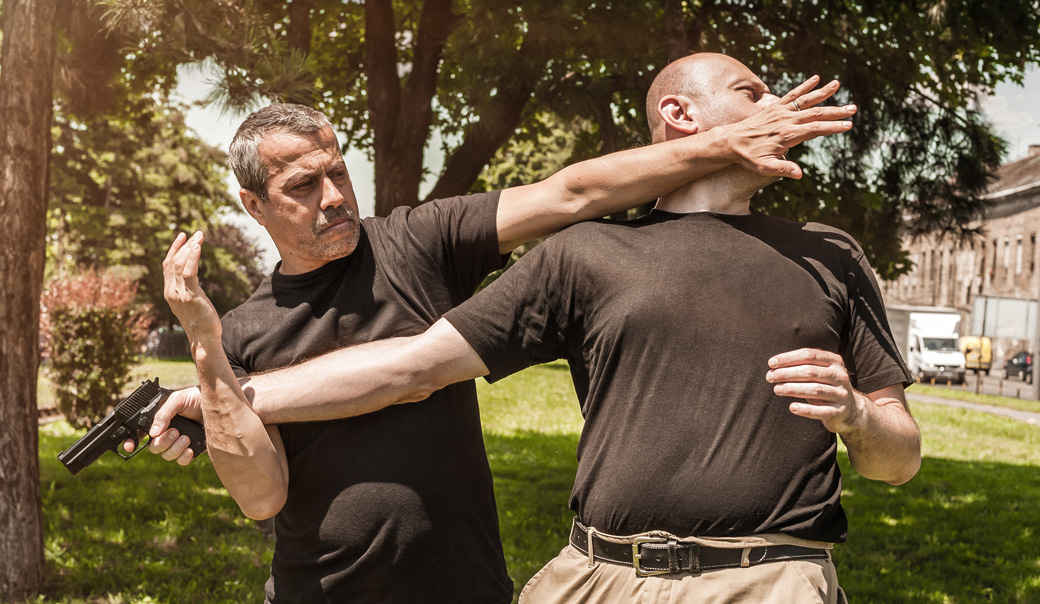Can an Assault charge be dropped if it was in self defence?
This week’s question is one that I get frequently; it asks about invoking “self defence” in an assault case.
In order to answer this case it is important to understand what an assault is.
An assault is defined at section 265 of the Criminal Code of Canada:
Assault
265 (1) A person commits an assault when
(a) without the consent of another person, he applies force intentionally to that other person, directly or indirectly;
(b) he attempts or threatens, by an act or a gesture, to apply force to another person, if he has, or causes that other person to believe on reasonable grounds that he has present ability to effect his purpose; or
(c) while openly wearing or carrying a weapon or an imitation thereof, he accosts or impedes another person or begs.
The definitions found at “b” and “c” are not nearly as common as “a” and they entail their own considerations. So for the purposes of this article, we will look at the most common form of assault “without the consent of another person; applies force; intentionally; to that other person directly or indirectly.”
As can be seen, the key elements are:
- Intentional
- Application of force to a person, directly or indirectly
- Without that person’s consent.
“Force” does not need to cause injury or bruising or marks. As most judges will instruct juries: “an assault can be gentle or it can be violent.” I once represented a person charged with a domestic assault on his spouse. The spouse claimed that my client spat at her and shoved her. My client denied that this happened. Independent, circumstantial evidence supported my client’s version. Ultimately, the judge accepted my client’s version that he and his spouse had a heated verbal argument (both parties being heated) but that he never physically touched (or attempted to touch) his spouse.
However, the client was also charged with assaulting his adult son, who got in between his parents during the heated exchange. My client lightly brushed his son to the side with the outside of his triceps. That was found to be intentional, and therefore an assault. (We still got the client discharged, but the assault was made out.)
So, in order for self-defence to even apply, there first needs to be evidence of the intentional application of force.
Self Defence
The self defence provisions were changed in 2012 and are listed at the bottom of this article for easy reference.
These changes replaced a confusing set of rules with another confusing set of rules (albeit less confusing).
In a nutshell, to use self defence, you need to
- Believe on reasonable grounds that actual/threatened force is being used against you or another person;
- The act which will be claimed as self defence needs to be for the purpose of defending or protecting themselves or the other person;
- It must be reasonable
“Reasonable Grounds” simply means that it cannot just seem like the right idea to the person invoking the defence, but it also must be objectively reasonable. An ordinary person in the shoes of the accused could come to this conclusion.
As for the requirement of the act being reasonable, there are a variety of factors in section 34(2) (“a” to “h”) which include things like the various sizes of the people involved (a smaller accused person might be more likely to invoke self defence than an accused person who is much larger than the person against whom the defence was being used); the circumstances themselves; the history of any relationship between the parties (so for example, if a person is known to be violent, perceiving them as a threat may be more reasonable; the use of a weapon (using a weapon generally requires a much more serious threat); and proportionality (a small threat can only entail a small response where a deadly threat can entail a deadly act of self defence). These examples in parentheses are very topical examples and—like most things in law—require elaboration appropriate to the specifics of the case.
To ask David Anber a question about self defence, please click HERE.
Defence of Person
Defence — use or threat of force
34 (1) A person is not guilty of an offence if
(a) they believe on reasonable grounds that force is being used against them or another person or that a threat of force is being made against them or another person;
(b) the act that constitutes the offence is committed for the purpose of defending or protecting themselves or the other person from that use or threat of force; and
(c) the act committed is reasonable in the circumstances.
Factors
(2) In determining whether the act committed is reasonable in the circumstances, the court shall consider the relevant circumstances of the person, the other parties and the act, including, but not limited to, the following factors:
(a) the nature of the force or threat;
(b) the extent to which the use of force was imminent and whether there were other means available to respond to the potential use of force;
(c) the person’s role in the incident;
(d) whether any party to the incident used or threatened to use a weapon;
(e) the size, age, gender and physical capabilities of the parties to the incident;
(f) the nature, duration and history of any relationship between the parties to the incident, including any prior use or threat of force and the nature of that force or threat;
(f.1) any history of interaction or communication between the parties to the incident;
(g) the nature and proportionality of the person’s response to the use or threat of force; and
(h) whether the act committed was in response to a use or threat of force that the person knew was lawful.
No defence
(3) Subsection (1) does not apply if the force is used or threatened by another person for the purpose of doing something that they are required or authorized by law to do in the administration or enforcement of the law, unless the person who commits the act that constitutes the offence believes on reasonable grounds that the other person is acting unlawfully.
R.S., 1985, c. C-46, s. 34;
1992, c. 1, s. 60(F);
2012, c. 9, s. 2.
Defence of Property
Defence — property
35 (1) A person is not guilty of an offence if
(a) they either believe on reasonable grounds that they are in peaceable possession of property or are acting under the authority of, or lawfully assisting, a person whom they believe on reasonable grounds is in peaceable possession of property;
(b) they believe on reasonable grounds that another person
(i) is about to enter, is entering or has entered the property without being entitled by law to do so,
(ii) is about to take the property, is doing so or has just done so, or
(iii) is about to damage or destroy the property, or make it inoperative, or is doing so;
(c) the act that constitutes the offence is committed for the purpose of
(i) preventing the other person from entering the property, or removing that person from the property, or
(ii) preventing the other person from taking, damaging or destroying the property or from making it inoperative, or retaking the property from that person; and
(d) the act committed is reasonable in the circumstances.
No defence
(2) Subsection (1) does not apply if the person who believes on reasonable grounds that they are, or who is believed on reasonable grounds to be, in peaceable possession of the property does not have a claim of right to it and the other person is entitled to its possession by law.
No defence
(3) Subsection (1) does not apply if the other person is doing something that they are required or authorized by law to do in the administration or enforcement of the law, unless the person who commits the act that constitutes the offence believes on reasonable grounds that the other person is acting unlawfully.
R.S., 1985, c. C-46, s. 35;
2012, c. 9, s. 2.
36 [Repealed, 2012, c. 9, s. 2]
37 [Repealed, 2012, c. 9, s. 2]
38 [Repealed, 2012, c. 9, s. 2]
39 [Repealed, 2012, c. 9, s. 2]
40 [Repealed, 2012, c. 9, s. 2]
41 [Repealed, 2012, c. 9, s. 2]
42 [Repealed, 2012, c. 9, s. 2]
David Anber
David Anber has been a trailblazing legal practitioner since 2006. His early entry into law practice during his studies marked the beginning of a distinguished career. As a member of both Ontario and Quebec’s bar associations, David excels in defending traffic and criminal cases across both provinces. David contributes to legal discourse through articles for the Defence Counsel Association of Ottawa and the Criminal Lawyer’s Association of Ontario.

